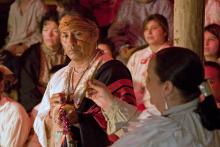
Cherokee Words--How Many? Part 2
Apr 22, 2016
Cherokee language has more words than English for some topics, and these may show what was important for thousands of years. In an earlier blog we talked about all the words for running. There are also a lot of words about speaking. These may reflect the importance of speech and oral tradition to the Cherokees.
In the 1700s Europeans commented on how long Cherokees took to make a decision, because they talked in council for days before coming to consensus. They observed that among the Cherokees, the skills of oratory were valued. Cherokee leaders became powerful because they could persuade people to their point of view. Thomas Jefferson, although he didn’t understand Cherokee, was moved to tears by a speech that Ostenaco gave at Williamsburg in 1762. In the 1800s, missionaries mentioned “The speaker” designated by a community or a delegation. The National Council also had a position for “A speaker.” These were in addition to the Cherokees who acted as interpreters with Europeans and other American Indian nations.
Words for speaking include:
Tsiwoniha = I am speaking (a language, or giving a talk) Tsalagi gayotli tsiwoniha = I speak a little Cherokee.
Gadiha = I am saying (as in he said, they said) Anadisgo’i = they say (habitually)
Tsinoheha = I am telling, as in telling a story.
Nitsiwe’a = I am vocalizing, making sounds. Also used for whinny, meow, bark, etc.
Tsinega = I am replying.
Tsine’isdiha = I am mentioning. Tsesdi tsakane’isdanvhi = Don’t mention it.
Tsiyalasda’eha = I am talking badly about someone (or stomping on something.)
Tsiyoseha = I’m saying to him or her. “Siyo” hiyosi. Tell him/her “Hello.”
Tsinetsidoha = I am speaking in various places
Tsinetsiloha = I am speaking repeatedly
Tsinetsisiha = I am speaking forcefully, or confirming something
Tsinetsega = I am going somewhere to speak
Tsinetsihiha = I am coming somewhere to speak
Tsinetsohvsga = I am completing the act of speaking
Some of these words were documented in the 1840s. We believe that there are may be many other words in archives and old papers yet to be discovered. Because people had enough vocabulary to speak to each other over the years they didn’t need all of these words, and some have fallen out of use. We always look for the old words because we believe the early words are the most pure, that contain Cherokee thought.
Each of these verb roots can be fully conjugated with ten people doing the action, in at least twelve tenses. They can be made negative, or made into questions. They can be further elaborated with prefixes.
Tsalagi didawoniha! Let’s speak Cherokee!

